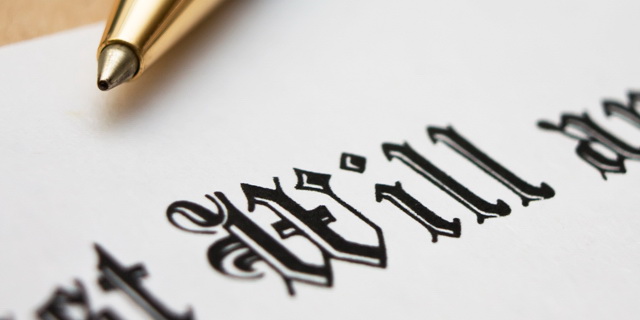The thought of making a will in India can be overwhelming for us, but it is pretty easy and straight forward to do so. Read on to know how to write a will in India.
We just discussed the need or rather the importance of a will in India in the previous post. It is a very important step in your financial life. Here we discuss how to make a will in India and what things you should remember while making a will so that it is not challenged by anyone or is not legally nullified due to some minor mistake here and there. A will, is after all a legal document that ultimately distributes the estate of the deceased in the manner in which he/she wanted it, when they are not around anymore. Hence it is imperative to make sure you comply with the basic requirements on how to write a will, so that there are no unpleasant situations in your absence.
Making a will in India
Making a will is simple and not too complicated a process actually. As mentioned in the previous post, a will can be simple hand written document on a plain sheet of white paper, signed by the person himself who is making the will. It need NOT even be on a stamp paper for it to be legally binding. However, there are still certain things you need to know while writing a will in India.

1. Date and Declaration about you:
It should mention your FULL NAME, Address, Date of Birth and also the fact that while writing this particular will, you are of SOUND MENTAL and PHYSICAL HEALTH and are NOT UNDER ANY INFLUENCE or STRESS and writing the will out of your FREE WILL.
It should also mention the DATE on which the will is written and in case this will is an Update on any previous will then it should mention the words ‘This Will supersedes any and all previous Wills by Me’ or else if there are multiple wills, then this can cause legal disputes among your heirs.
2. Details of your Assets:
Second part of the will should mention the details of your assets and their current value and location. This includes details about your Properties, its addresses; list of all your Shares, Debentures, Mutual Funds, Cash, Jewellery, Bank FDs, Bonds, everything that you have and would want it to be distributed. It is a good practice and much easier while distribution, if all the assets are bulleted by numbers or alphabets, like the example below:
As on this Date I own the Following assets:
A. 1 BHK flat at (Full Postal Address with City and Country) purchased on (date of purchase) for a value of (purchase value)
B. Bank Fixed Deposits of Rs. 2 Lacs with This Bank, Bandra Branch.
C. 200 Units of Mutual Funds of Reliance Growth Fund
D. 100 Shares of Reliance Power in Demat A/c No. Xxx0921
3. Distribution of the Assets mentioned above:
The 3rd part of your will should have the details of who gets what form your assets after you are gone. You have to Mention Full Name, Address, Date of Birth of the Person to whom you wish your assets to be distributed and in which quantity. For Example:
After my Death the Assets I own should be distributed in the Following manner:
Item (A) should given to my wife Katrina Akshay Rai, Whose Mother’s name is (Name) and Father’s Name (name) Staying at 420. RoopMahal, Prem Nagar, Bandra West, Mumbai – 400050 born on the 29th Feb, 1980.
Item (B) should be given to my son Ranbeer Rai, staying at (Address) born on the (DoB)
And so on…
4. Signatures and Witnesses:
The last part of the will and also the most important is the your Full Signature along with two witnesses who can thus act as proof that it is indeed you who has written the will. These Two Witnesses however should NOT be your immediate family members or spouse or anyone who is a beneficiary in the Will. This is because it is a proof that they have no vested interest in your will and only are proofs that you have indeed written the will.
Appointing an Executor of your Will
An executor is a person who is responsible for executing the will after you are gone. He/she will also carry out the distribution process mentioned in the will. This person can be anyone but whose prior consent is taken by you and of course, he/she have to be trust worthy. It is not compulsory that the executor be a lawyer. Preferably the executor should be younger to you, since the chances of a younger executor to outlive you are higher, although unpredictable; so when the need arises, he can be around.

Storing and Registering the Will
The will needs to be safely stored in its original at a place that is accessible to the executor once you are no more; if it is a bank locker than there needs to be an arrangement with the bank regarding the access to the will for the purpose of execution. Will can be stored anywhere as long as it is accessible to the executor as well as safe from any tamper or misplacement.
Although it is NOT compulsory to get your will registered, you can do so if you need an added assurance that your Will would be safely executed once you are gone. A registered will is difficult to be challenged and is kept in the safe custody of the registrar. You can visit the registrar’s office along with the witnesses to get your will registered. Your executor or the beneficiary may also get the will registered once you are no more.
Probate a Will
Probating a will simply means a copy of the will certified with a Seal of the Courts. Probating a Will is important in case of Property. In case where the property is being transferred via a will, the beneficiary needs to Probate in courts the will and there is a stamp duty and legal charges that needs to be paid. This process may take around 6 months and the stamp duty payable on the value of the property, is as applicable in that particular state.
Changing your Will:
A will in India can be changed anytime but it should mention that this Will Supersedes any other will you may have previously written. In case the will is registered, then the process of changing the will is a bit tedious since you have to go to the registrar’s office to submit the changed will and nullify the previously registered will with the registrar.
It is advisable to make a Will early on in Life and make changes to it from time to time and especially when there is a major transaction that may impact your assets. If you are selling a property that is mentioned in the Will, make sure you change your will. If you have bought some new property, again mention it in the will and make changes.
Things to Remember while writing a Will in India
1. Never make the witnesses who your spouse or beneficiaries in the will. It may raise questions of vested interests and can lead to unnecessary disputes and can be challenged in courts.
2. Do not keep multiple copies of your Will. Just one Copy and an Original is enough. The original can be stored in bank locker or with the registrar and the copy can be safely stored elsewhere with you. You should inform your kin about your will and its whereabouts, so they know that such a will does exist. However you DO NOT have to reveal the details in it to anyone.
3. Preferably get a lawyer to go through your will so that you are sure your will is error free and cannot be challenged in the courts for its legalities once you are gone.
4. Mention the Percentage distribution of the Assets and not the Value. Values fluctuate from time to time and hence mentioning percentages is recommended. For example if you wish the house you live in, be sold and the proceeds distribute among your kin, mention who gets what share in percentage terms as in A get 25%, B gets 35% and remain 40% remains with C and so on.
5. As per Hindu law, ancestral property is only inheritable, so you cannot mention that the property is transferred to A, B or C, it will only be inherited by your legal heirs.
6. Always, always Date your will. It is very important.
So, now that you know the importance of a will in India as well as how to make a will, I hope you are thinking on writing your will sooner rather than later.
Leave a Reply